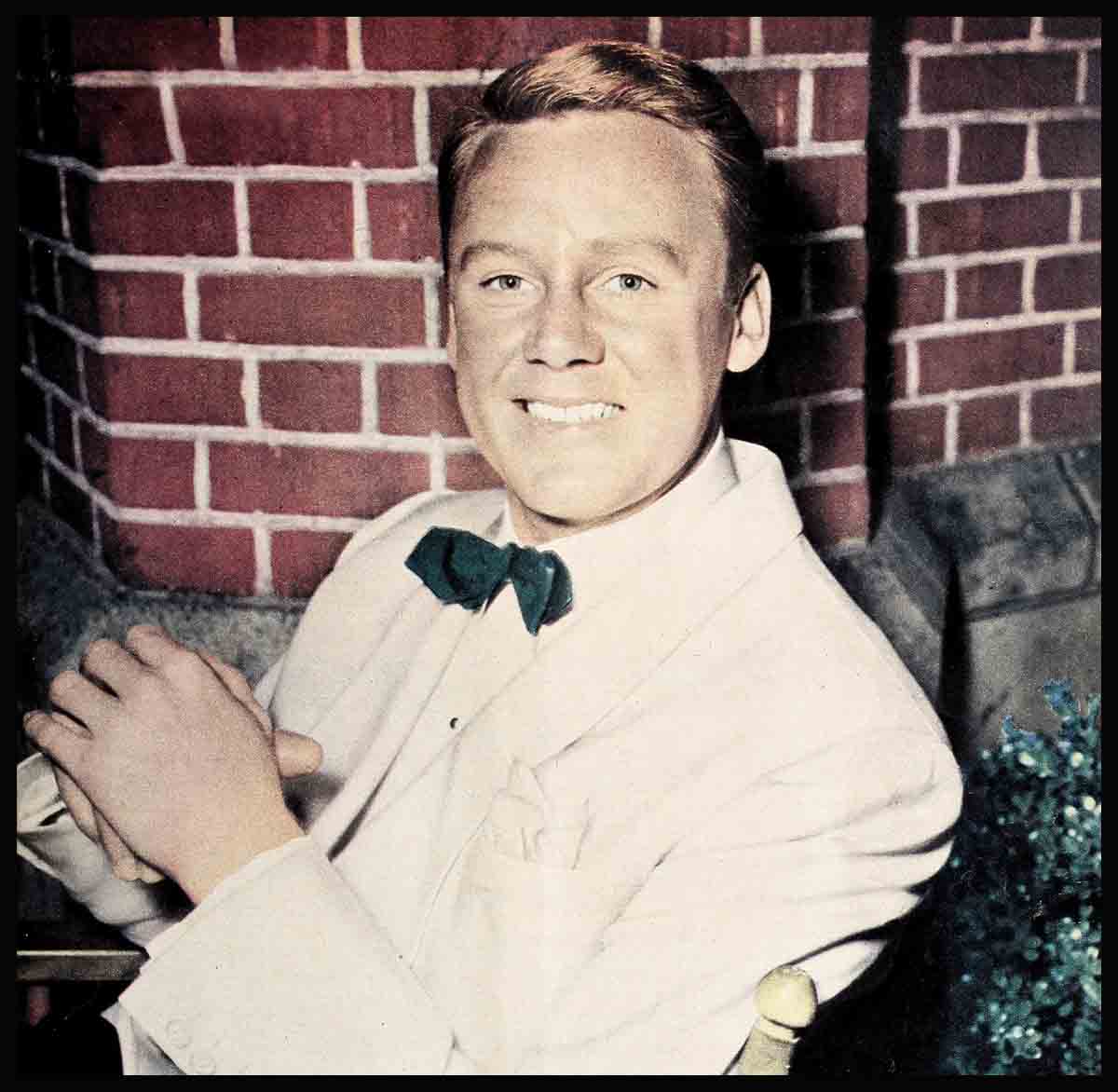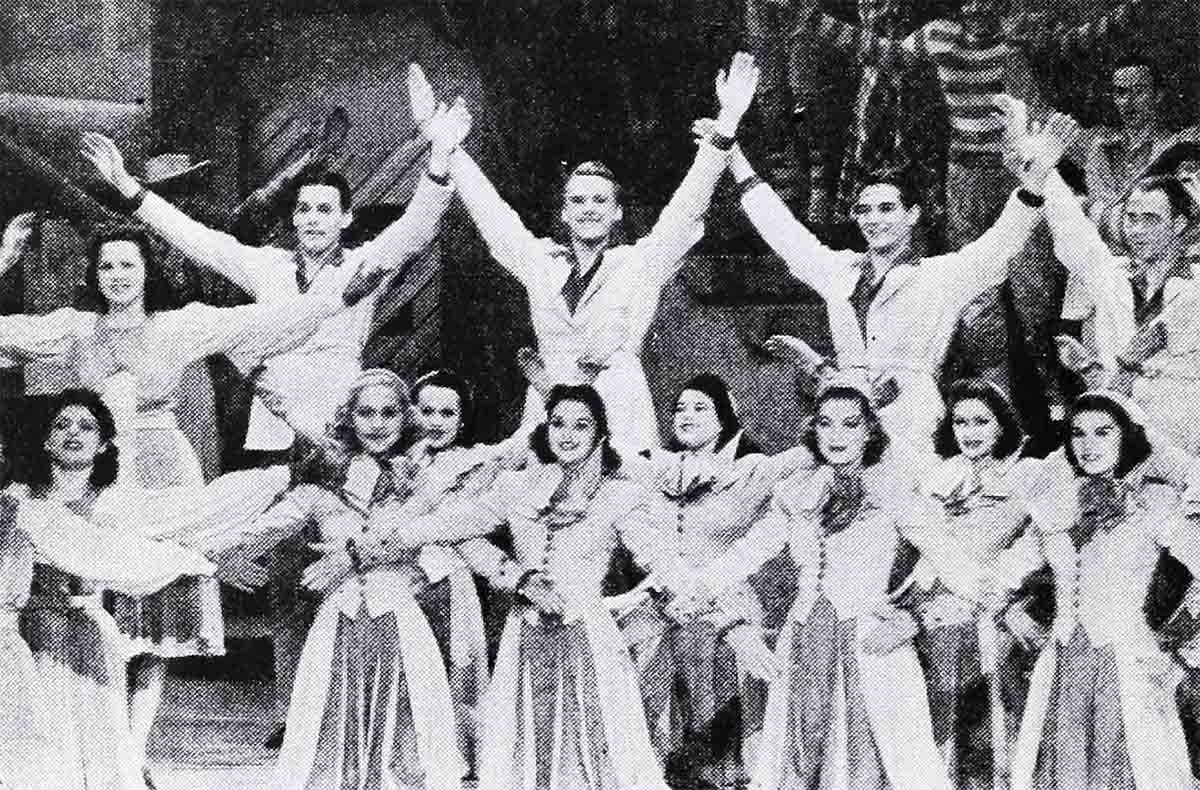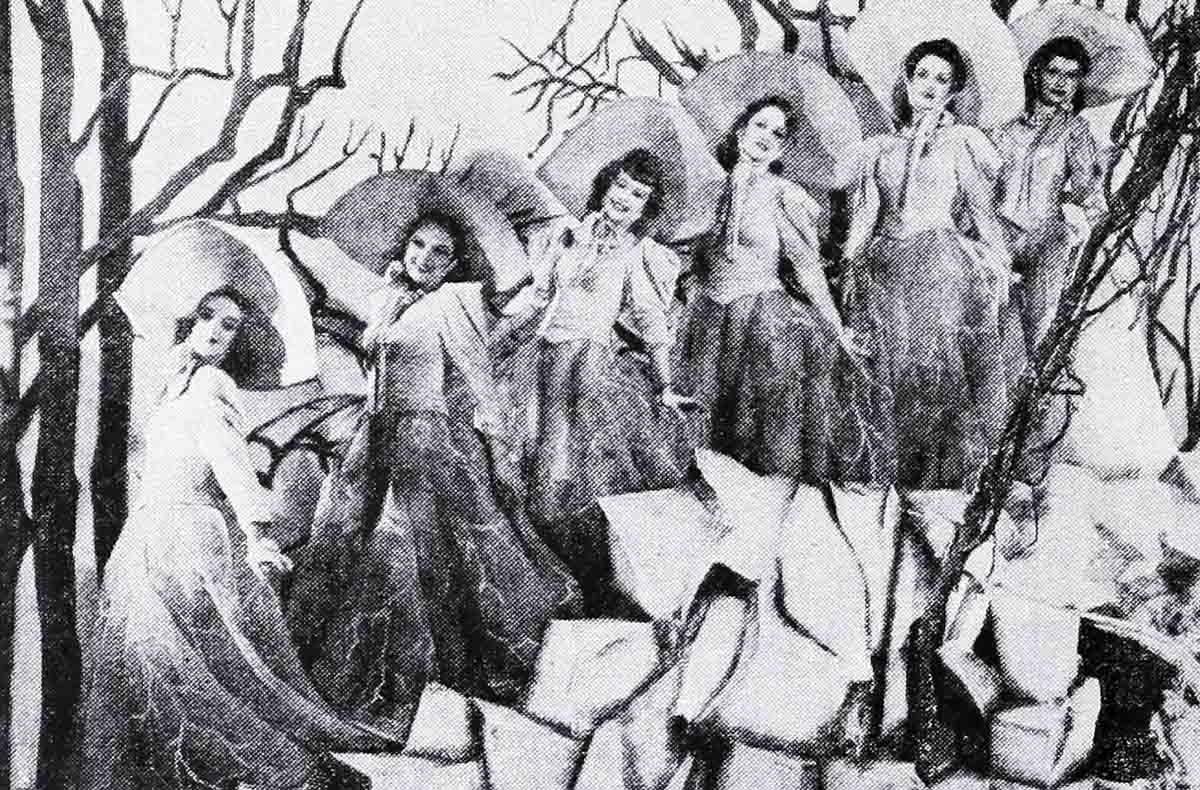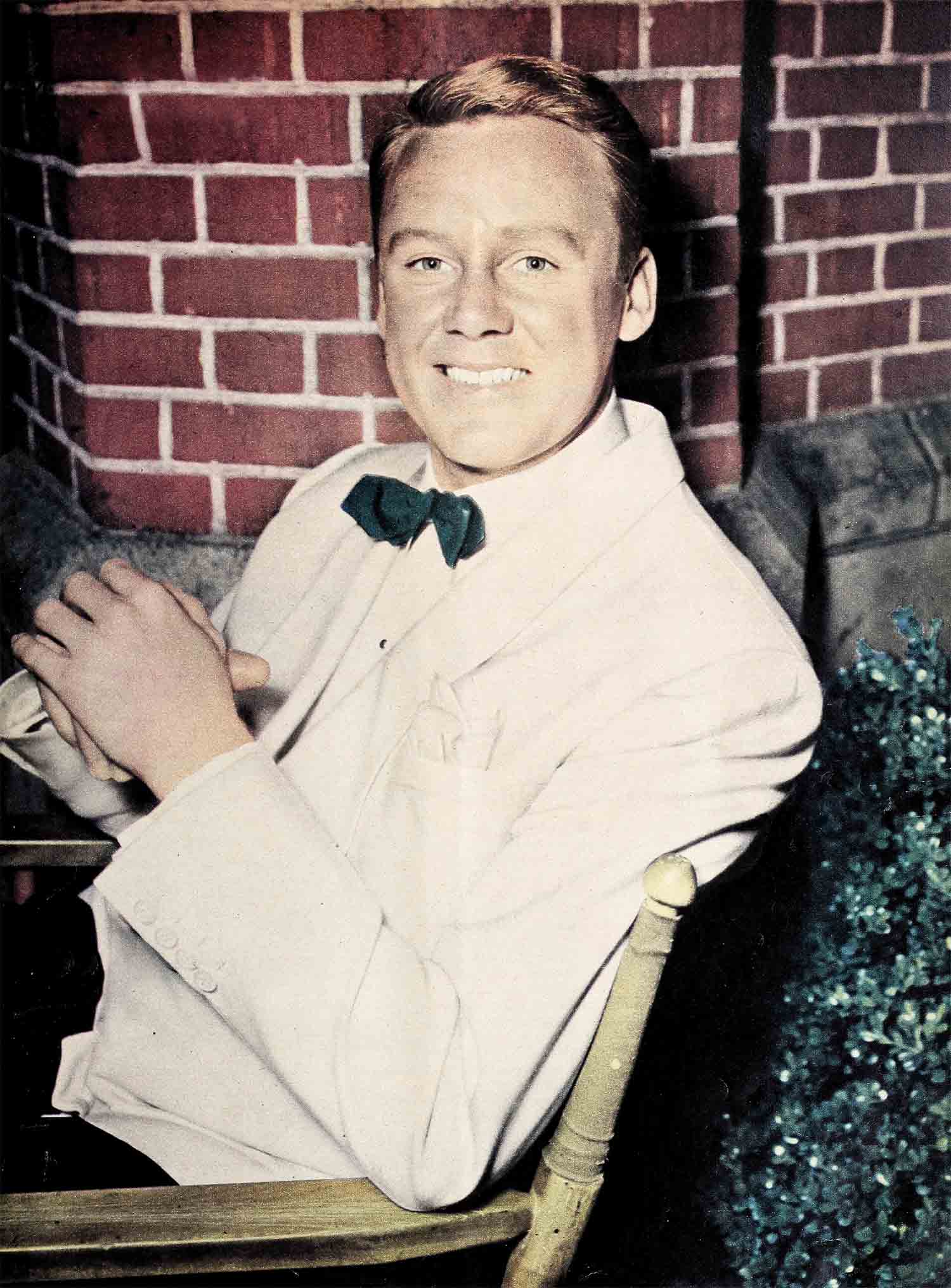
June Allyson: “The Van Johnson I Know”
The other day I was stopped on the lot and asked, “Can anyone explain this terrific popularity of Van Johnson’s?”
I burned, even though I know that when a player hits the tremendous stardom that Van has, in such a brief time, there are always those who pretend it must be based upon something other than personality and ability.
Answering this feline, I drew myself up to my full five feet two and said, “Yes, I can explain Van’s popularity. I know today it’s based on exactly the same qualities I saw in him when I first met him, when neither one of us was known to anyone. Success has to come to Van because, in addition to outside things like his handsomeness and his tremendous acting ability, he is so good inside.”
You see, I knew Van when. He knew me when, too. He hasn’t changed one hit. The only thing success has done to him is to make him even nicer.
“When” was the season of 1941 on Broadway. It seems like more than four years ago. As I look back. Van and I were such babies, such dreaming babies.
Van was fresh in from Newport, Rhode Island, and some chorus work on the main stem. I was fresh in from Lucerne, New York, by way of a session at Roosevelt High, up in Westchester County, which is just outside the Big City, and some chorus work in “Very Warm For May” and “Higher And Higher,” both of which had flopped with dull thuds. At the time we met, we both were understudies. Van being Gene Kelly’s understudy in “Pal Joey,” I being Betty Hutton’s in “Panama Hattie.” While we didn’t exactly wish that our stars would fall down and break their legs, we did sort of dream that they might feel a bit indisposed one night when every manager on Broadway would just happen to be out front!
That never came true, of course.
An understudy’s salary is, I assure you, a very little thing. I was living over at what was then called the American Woman’s Club with one of the most talented girls I’ve ever encountered, Betsy Blair. Betsy is in real life all that Claudia is in stories, and she had then the most desperate crush on Gene Kelly. Today, as you probably know, she is Mrs. Gene Kelly.
But at that time she expected to go right on with her career, just as I did with mine, and we never talked anything else. The American Woman’s Club was one of those very respectable, very inexpensive places to live, not too conveniently located, and a place where no man would park for so much as five minutes in its spacious, elegant lobby. That didn’t matter to Betsy. With Gene in the big stardom money, she had glamorous dates all over town, at roofs and night clubs and such places, where I’d never stuck my nose in, much as I yearned to. Strangely enough it wasn’t Betsy, who knew Van well, who introduced him to me. It was another girl I had lived with a few months before, Marion Franklin, who is now under contract to Paramount. One night, she called and said, “I want you to meet a grand guy. His name’s Van Johnson and you two will like each other.”

I’ll never forget him as he came into that living room of Marion’s. Her apartment was over on West 54th Street and Van was so big and broad shouldered that he made the room seem suddenly small but all aglow, lighted up by that red hair of his and his overwhelming grin.
Van possesses one remarkable quality, a quality that few people have and actors almost never. He is instantaneously and completely interested in every one he meets. He’ll gladly and very simply talk about himself, without any affectation and answer any questions you ask, but all the time you get the idea he’d much prefer to talk about you.
Well, when he turned that million-candle-power interest of his on me, did I fall for it! Before I knew it, I was chattering away at him about my career, what I wanted to do, where I wanted to go, the dreams I had. I even told him about Tommy, the boy I was dating that season of 1941. I said I was in love with Tommy. I thought I was then. Van said, “Well, would it be all right by him if we went to a movie together one night?” I said, “Oh, yes.” Van said, “I’ll call you.”
Every girl knows that line. That “I’ll call you” routine has been the death knell of more first meetings than any other thing. So I was a very happy chappie when, a few days later, Van did telephone and ask if I’d like to go on Sunday to a Margaret Sullavan picture at the Music Hall. Sunday was, you see, the only night of the week either of us had free.
I don’t remember it, but I’m sure that sometime during that first evening I must have prattled on to him about Margaret Sullavan being my ideal. I tried to copy everything she did. I even played tricks with my voice trying to make it sound like hers. So Van, the angel, on our first date, took me to see her.
Over a soda afterward, we discussed acting. He said Spencer Tracy was his guiding star. I said, “Well, next time we’ll go see him,” and then I blushed at seeming to be setting up a second date, but Van said, “You bet we will,” and about three Sundays later, approximately five minutes after I’d noticed that a Tracy picture was opening at the Capitol, there was Mr. J. on the telephone again, inviting me to go to it.

Van called for me early that evening and said, very casually, “Would you like to go for dinner first?”
I don’t know what gave me my hunch. Maybe it was that he wasn’t as good an actor then as he is now, and his voice had been too casual. Somehow I had the impression that he was just as broke as I was, which was almost at the starving point. I was at that financial state where when I bought a dress I went without lunches. That week I had bought a new dress. In fact, I had it on right that second. Maybe Van had bought a new suit!
Anyway, I said, just as casually, “Well, I can only eat a bite. How’s for a hot dog at Nedick’s?” Van said “Swell!” with such enthusiasm that I knew he was very relieved.
Such a great, big dinner date gave Van courage, I guess, to ask me for “lunch” dates and afternoon dates, when we didn’t have matinees. We “lunched” at Walgreen’s Drugstore, walked up to Central Park, which doesn’t cost a dime, and sat by the lake, which is free, and talked and dreamed, which are riches open to all penniless people everywhere (and may none of us ever lose them).
We really dreamed out loud on those dates. Van confessed he would never be entirely a big-city character, that the country and ocean, and swimming and sports were in his blood. That was one of the reasons he dreamed so much of Hollywood. He wasn’t sure if he’d screen or not, but he knew the Hollywood life would delight him. The very big thing he wanted, of course, was to go on with his career, but he also dreamed of a lot of small things. He wanted a blue convertible roadster. He told me the kind of a house he wanted—a very simple one, and very quiet, where he could relax and read. (He’s an omnivorous reader.) I said those were the things I wanted, also; a country life, books, a few good close friends and the excitement of my work.
We had lots of those “park dates.” I remember one beautiful spring day, when we sat watching the children sailing their toy boats along the lake. Van said, “June, we’re bound to reach Hollywood, you and I. When we’re out there, if ever I get to be half-way important in some picture that’s big enough to have a premiere, why you’ve got to be the girl to go to it with me. We’ll go to dine at the most expensive place in town and eat the most expensive food they have on the menu.” I said, “Oh Van, just suppose that we might someday be in a picture together. Wouldn’t that be wonderful!” We looked at one another and just sighed, blissfully.
There was another day when Van deliberately got me on the subject of Tommy. I went yak-a-ty, yak-a-ty, yak until I suddenly realized that Van was being unusually quiet. I finally paused and asked, “What are you thinking?” Van said, “It’s none of my business, Junie, but Tommy isn’t the right guy for you. I’ve not even met him, but I know that the things you want and the things he wants aren’t one bit alike. That’s no kind of a foundation for a lasting happiness. I don’t think you should marry him.” After that, he never once mentioned the subject but that’s typical of the way Van concerns himself with other people’s problems.

1941 went swiftly by but right at the start of 1942 I got two blows. Van got a bid from Warner Brothers and left for the Coast, and the closing notice went up on “Panama Hattie.” On the latter, I had had one evening when I played Betty’s role. Some important people did see me, and apparently thought I was pretty good, so I got signed for “Best Foot Forward,” along with Gloria De Haven. I had a chance at a real specialty in this one. The show settled down into a run, and as spring came round again, I discovered Van was right. Tommy and I weren’t really compatible. We broke it off.
Now, I have to interrupt myself here to say something very personal. I hope no girl reading this story knows as much as I do about being plain looking. Jiminy, how that knowledge does hurt! I’ve always known I’m nothing much to look at and yet, on Broadway and now in Hollywood, I’m in work where beauty surrounds me on every side. When Gloria De Haven and I were making “Best Foot Forward” together I nearly died every day when photographers would come on the set and take snaps of Gloria. They’d be very sweet to me all the time but they’d say, “We know you understand, Junie. You see we have to have real glamour stuff.”
They didn’t mean to be cruel. I know they were being no more than truthful. The theatrical profession is like that everywhere. People tell those blunt truths and you have to learn to accept them or collapse. Which doesn’t prevent that kind of realism from hurting you like the dickens. By the time Gloria and I got to “Two Girls And A Sailor” I had become accustomed to her beauty. That is, I knew I couldn’t compete with it. All I could do was relax and be myself.
Meanwhile, Van’s first movie, “Murder In. The Big House” was released. I rushed over to see it at the very first show on its opening morning and nearly collapsed. They’d dyed Van’s hair black. They’d obscured his freckles and by miscasting him they had completely buried his charm. I sat watching him and thinking, “I must have been wrong. I’m afraid he can’t act at all.” Warners agreed with me and let him out of his contract. But in March of that same year Metro-Goldwyn-Mayer signed him. I read about it in the papers. I sighed, and I had to hang tight to remember that commandment against covetousness. But M-G-M! Zowie! The company that had both Margaret Sullavan and Spencer Tracy under contract. The place where you could see Garbo and Joan Crawford and Clark Gable and all those super people! Lucky, lucky Van!
“Best Foot Forward” bounced along and in late summer, if Metro-Goldwyn-Mayer didn’t buy the whole show including the contract of one J. Allyson. On September 14, 1942, I, June Allyson, found myself under contract to that miracle company where Van was! That date is graven on my memory for always.
With us both smack on the same lot, only people who know Hollywood and its crazy ways will understand how it was possible that Van and I did not run into one another. In Van’s case, Metro saw in him the talent Warner’s had overlooked and then for months they were grooming him like crazy, which meant he was working and taking every kind of lesson every minute.
Me, I was tied up, too. So actually while we did chatter by phone, it wasn’t until September 9, 1943, the day we started shooting on “Two Girls And A Sailor,” that Van and I got to see one another. Oh, it was so wonderful seeing him again. All Hollywood was buzzing with the word that he was Metro’s white hope, and while I couldn’t believe he’d ever get a swelled head, still I knew some mighty nice people had. But not Van. He bounded across the stage toward me—there was the same old grin, the same wonderful sparkle, that same, vivid interest in the other person—in this case, excited me.
Van began coaching me on the best way to stand, the correct way to place my voice, how to pace my dancing. He helped me on the selection of my clothes, quickly showing me that what was good taste off-screen just washed out on-screen and looked dull. All through that picture, instead of trying to steal scenes away from me, he was giving them to me.
We finished “Two Girls And A Sailor” and with my first real money I went out and bought a blue convertible roadster. A few nights later. Van came to call on me and if his car wasn’t a blue convertible roadster, of the same make and model! We knocked ourselves out with laughter and to make everything homelike barged right out to the nearest hot-dog stand.
Of course, you know what happened to Van, Gloria and me on the strength of that blessed “Two Girls And A Sailor.” The public was so good to all of us that we suddenly were on our way up and Van was almost knocked off his feet by the announcement that he was to play with his idol, Spencer Tracy, in “Thirty Seconds Over ‘Tokyo.” In fact. Van became so box-office hot that he was rushing from picture to picture and by the time “Tokyo” was ready for release he was just about the most important boy in town.
“Tokyo” was announced for a big premiere. I thought of our conversation by the Central Park lake. I hardly dared hope that Van would remember it, too.
About a week before that big night Van called me. “We’re invited to Mervyn LeRoy’s for dinner before the premiere, Junie,” he said. (Mr. LeRoy directed the picture.)
“Me?” I said carefully.
“Say, you haven’t forgotten your promise, have you?” Van thundered. “Junie, you’ve got to go to the premiere with me and I still want to take you to the most expensive place in town for the most expensive food. I will, too, but we’ll do it after the show, not before.”
We had a wonderful dinner with glittering people we’d never dreamed we’d know. We went to the opening, and you know how terrific Van was in that picture. We went to Mocambo and we selected everything by price first and taste afterwards, and we danced and danced, and finally we took the long way home. It couldn’t have been more perfect, possibly.
But the loveliest part was just knowing a boy who could have had anything Hollywood had to offer that night, who could have been ritzy, but who remembered instead a silly promise and kept it.
That’s why I know now that even if weeks elapse in both our busy lives without seeing one another, nothing will ever change Van’s and my friendship. It’s because Van himself will never change in those inner qualities that make a fine man.
THE END
It is a quote. PHOTOPLAY MAGAZINE SEPTEMBER 1945




